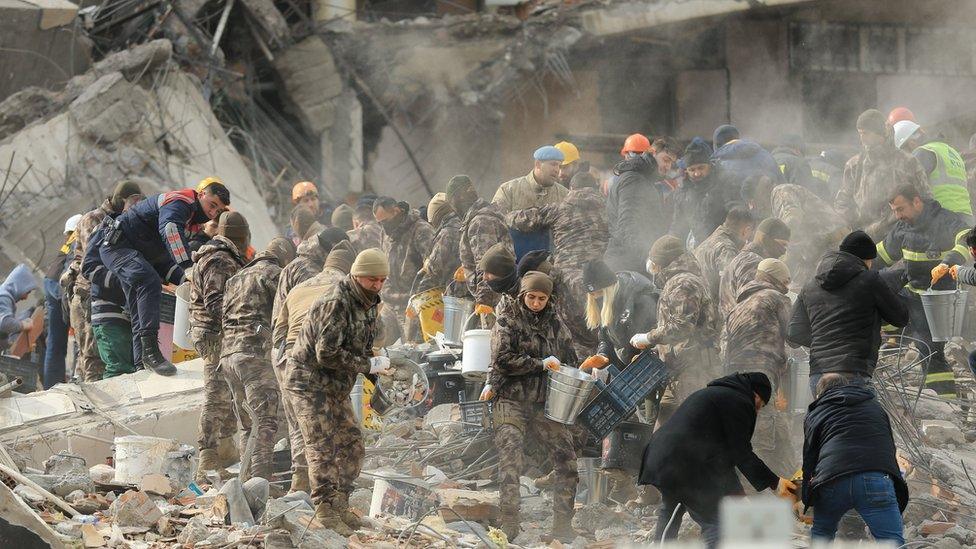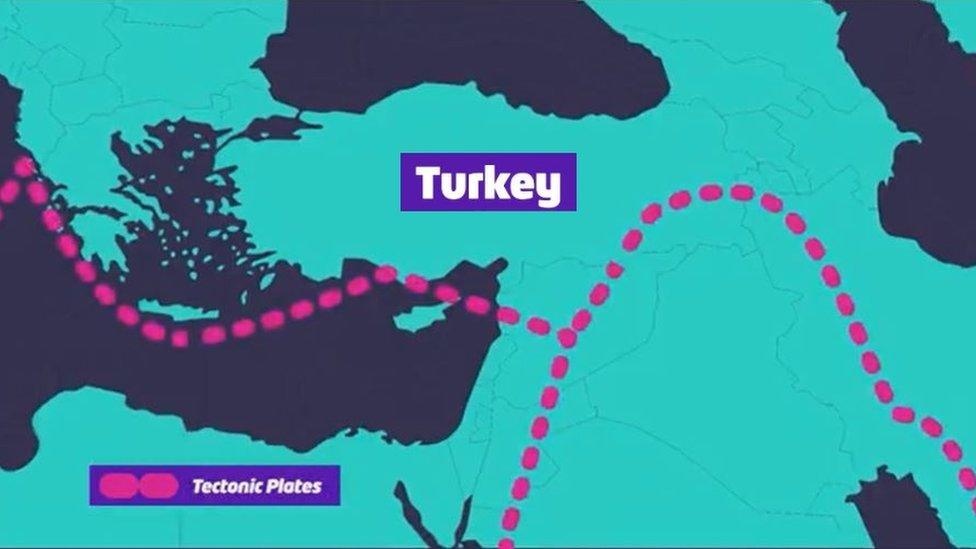Turkey-Syria earthquake: Rescue services helping after huge quakes
- Published
- comments
Turkey-Syria earthquake: Children in refugee camps need blankets, toys and books
Emergency services and rescue teams are continuing to help people in southern Turkey and Syria after two powerful earthquakes struck the region on 6 February 2023.
The Turkish government and the United Nations say millions of people in both countries need help with shelter as they have lost their homes or live in areas where buildings are damaged or still dangerous.
Help is being offered from around the world, with aid arriving from more than 65 countries who are sending food, medicine, shelter and supplies as well as specialist teams to help the rescue effort.
In some areas, tents have been set up into camps to give people shelter, but it's winter there and it can be very cold.
The situation in Syria is particularly difficult as a long war has been going on in the country which is making it even harder for aid to get to the people who need it.
Turkey-Syria earthquake: What has happened?
Turkey earthquake: Rescue teams help people affected in Syria and Turkey
In the early hours of Monday 6 February, a 7.8 magnitude earthquake struck regions in southern Turkey and northern Syria.
This was followed a few hours later by a second earthquake in the similar region, which had a magnitude of 7.5.
The first quake was so strong it was felt in various Turkish cities, including the capital Ankara, as well as in neighbouring countries Syria, Lebanon and Israel.
Turkey's president, Recep Tayyip Erdogan, has called the quake "the disaster of the century".
The disaster destroyed thousands of buildings, and affected 10 cities. As well as the damage caused, many businesses had to shut and the government closed schools in many areas.
The United Nations says about 13.5 million people - including around seven million children - have been affected in an area spanning roughly 450 km (280 miles).
Earthquake: What's Happening in Turkey and Syria
Rescuers have been helping people after hundreds of buildings collapsed in both countries, and search teams have been working through the night, although freezing temperatures, snow and rain have made conditions difficult.
Some experts believe the first earthquake could be Turkey's largest on record.
The earthquake has had a huge impact - hundreds of thousands of people have been affected, many thousands are hurt and more than 30,000 have died.
How are UK charities trying to help quake victims?

Search and rescue efforts have been taking place or over a week
National governments of many countries including the UK, the US, China and Russia are providing aid, including search and rescue experts.
And many charities are also launching appeals and sending teams to the area.
Some UK aid agencies - including the British Red Cross, Oxfam and ActionAid - are joining together to raise money under one group - the Disasters Emergency Committee, which launched its appeal on Thursday 16 February.
The British Red Cross says it is working in conjunction with the Turkish Red Crescent and the Syrian Arab Red Crescent, and is providing support and evacuating people to safety.
Oxfam is another large charity to have launched an appeal. It said it would focus on providing "protection, water and sanitation, shelter and food", while also assessing the longer term needs of people affected.
Some Turkish and Syrian communities in the UK have launched their own local donation drives.
How can I help people in Turkey and Syria?
Turkey-Syria earthquake: The school kids raising money
If you want to help and support people affected, there are many different ways of doing that.
You could give money to charity, raise money with friends at school or speak to your local church or mosque about what donations they want and need.
Why are there earthquakes in Turkey and Syria?
Earthquakes: What are they and what causes them? (2018)
Situated on or near several fault lines, Turkey is one of the world's most active earthquake zones.
Earthquakes often happen when two giant pieces of the Earth's crust - called tectonic plates - rub up against each other. The points where they meet are called fault lines, or faults.
Earthquakes are measured on a scale called the moment magnitude scale.
A tremor of 2.5 or less usually cannot be felt, but can be detected by instruments.
Quakes of up to five are felt and cause minor damage.
The Turkish earthquakes at 7.8 and 7.5 are classified as major and usually causes serious damage.
Most of Turkey is on the Anatolian tectonic plate, which sits between two large plates - the Eurasian and African plates - and another smaller one, the Arabian.
As the two large plates shift, Turkey is essentially squeezed, experts say.

Turkey sits between two large tectonic plates
These earthquakes have happened around what's known as the East Anatolian fault, which runs south-west to north-west of the south-eastern border of Turkey.
Seismologists have long recognised that this fault is very dangerous, though there has not been any significant activity for more than 100 years, but it has been responsible for very damaging earthquakes in the past.
Although Monday's earthquakes were very large, smaller ones are common in the country.
The country's Disaster and Emergency Management Authority (AFAD) recorded over 22,000 in 2022.
